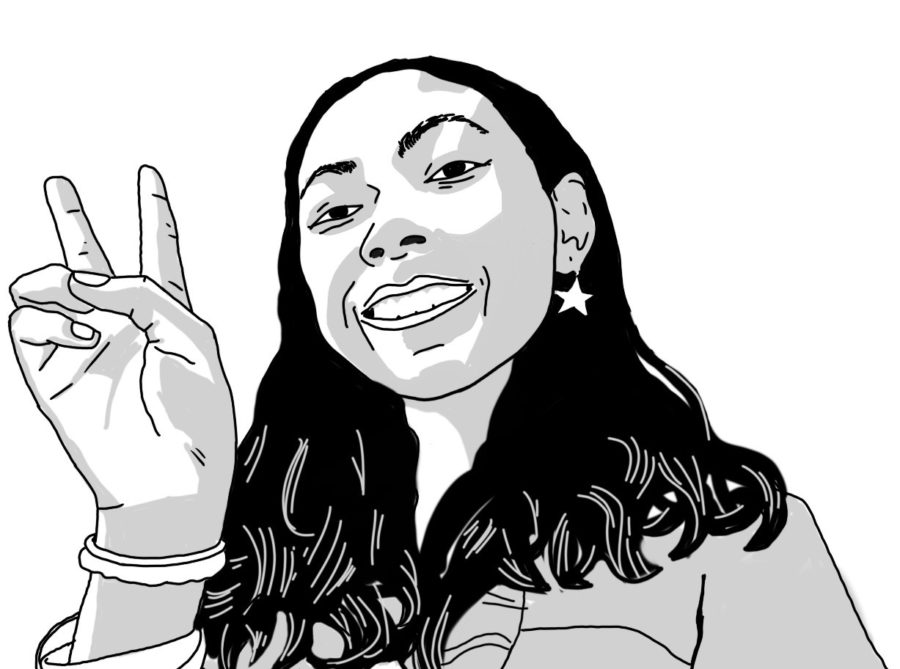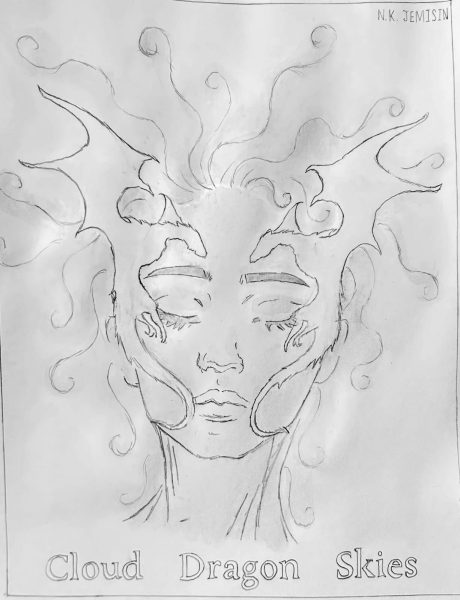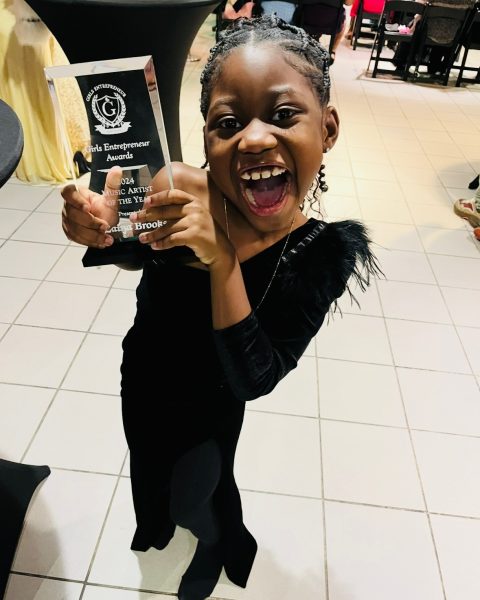Black Excellence Features
Kiana
Q: What activities are you involved in?
Kiana: Okay, so in Capitol Hill there’s this organization, they basically provide opportunities for queer youth and specifically BIPOC queer youth, and they’re called Gay City. And I’m doing their first cohort of this mentorship program that works with Naa Akua, who’s this queer poet and spoken word artists. And then Moonyeka who’s this queer dancer, and it’s basically just about encouraging, like creative arts for people who are like marginalized and have less access in general and more disparity in their communities.
Q: What sort of work do you do with them?
Kiana: I’m personally doing music for this one, because like, I do a lot of visual art and like spoken word. And I felt like I wanted to get in tune with music more especially like, between February and just like connecting with my blackness, I felt like music was a big, like, I don’t know, personal structure for why I started singing in the first place was like gospel and things like that.
Q: How did you get involved with that organization?
Kiana: I got involved by like, I randomly went there with my mom when we were in Capitol Hill, because I was like, I’ve heard this place is cool. And I know they provide like other things, other resources, like it’s a free library for one, but besides just books being resources, they have literature, they have youth programs, they have events that they host. And they have things like free clinics, like just for access in general, which I thought was really cool. Kind of word of mouth.
Q: What’s something you’ve done that you’re really proud of?
Kiana: Well, I don’t know if you’ve seen my poem and advisory slides, but I’ve done a spoken word for like Black Lives Matter. I do spoken word with Youth Speaks. I traveled to Wisconsin with them. And I don’t know, maybe you see my art around school or something.
Q: How would you say you express yourself through your art?
Kiana: Oh, that’s a great question that I feel like I’m underprepared for because like, I don’t know, I don’t even go into it intentionally, like this is how I’m going to express myself, I come into it with the mindset of like, I’m here. And this is the community that I want to reach. Not necessarily, like, I don’t know, the message that I go into it with, it’s usually just, this is something that makes me happy. And then I want to, like pass that same emotion on to other people, whether they’re also queer, also black or also mixed, and things like that, just like yearning for the connection, I guess. And yeah, I walk into it pretty much with: this is the emotion that I want to transfer onto others. And hopefully, if they can see that we connect through my story, that’s all the more better as far as intersectionality and spreading awareness.
Q: What does excellence mean to you?
Kiana: Oh, excellence for me is like, the profound like, I don’t even know, excellent is a huge word. But I was gonna say like, the first thing that came to my mind is profound, like joy of self, like self care before, like the acceptance of what other people say you are, I think the like deepest excellence you can achieve is loving yourself and making time for yourself, whether that’s your art, or your passion, or your writing in the messenger, and things like that, like talking to people, just like the everyday little things that you almost take for granted. That’s the biggest thing to me. That excellence means not the things that go on your college resume. It’s the things like in your everyday community, like you’re just hanging out with your grandma, you like watching TV with your parents. That’s excellent to me.
Q: What do you think others can do as young people to make positive change?
Kiana: Oh, yes for positive change, I for sure, say go into the arts. Like at least try. I always say like, [that] people are afraid of trying artistic things. They’re like, ‘Oh, I’m not a good drawer’ or something like that. And I’m like, it’s not about how it looks. It’s about how it makes you feel. And I think that’s the biggest thing, whether it’s like if you’re like, ‘oh, I don’t like dancing in front of people.’ Like maybe it’s fun just to dance like not even in front of people. It doesn’t have to be about performing or like being showcased. It can just be for yourself, too.
Q: Who inspires you?
Kiana: Oh, man, people like Lakelle inspire me, you inspire me, I don’t know. Honestly, anyone that works in a creative medium is cool to me. Whether they’re just like talking, whether they do speeches, whether they do poetry, whether they do articles, but like, everyday people that inspire me, I think definitely first my parents cause I’m mixed. So an interracial marriage in itself, is like, not necessarily impressive, but I think it’s a statement and a symbol for hope and itself for me. And it’s always driven me to be like, I don’t have to be, you know, the odd one out ,the unicorn in the group. I can be my own thing and be that much cooler because I have this game, you know, experience in this game – [a] wider perspective.
Q: Do you see yourself as a leader? In what ways?
Kiana: Yes. I see myself as a leader for definitely speaking out for my communities, like I advocate for being black,and like, I advocate for being queer. And I advocate for being somewhere in between both of those things, I advocate for being mixed, I think, talking about it for one, spreading awareness making sure like, in everything you do, you don’t actively have to be like, Oh, this is a special thing. Like, because I’m that black artist, it doesn’t have to be the thing you’re defined by or tokenized by. But I think if you go into it with the like the knowledge that and the understanding that I’m doing this, and because I’m black, because I’m these other things, it has that much more, like, I guess, personal meaning and might have value to people from those same communities, that that in itself is like activism, it doesn’t have to be direct, I guess. And that being a leader is like, just that mentality of I’m here. And I’m fighting for something like in whatever way that I am to push for more rights to have more and more open spaces and just a better world.
Q: Do you have any advice or messages for other Black creatives or activists?
Kiana: Maybe some insight is just for sure it’s like if anything is holding you back from your passions, whether that’s people in your life, or that’s like a system that’s telling you like, either because you’re black or because you’re chasing art, like to just chase your dreams in whatever aspect you can even if it’s not what you’re pursuing, to like, keep that being a daily and regular thing in your life because that’s so important, just for your own mental health and well being.
Patience
Q: What activities are you involved in?
Patience: I am the outreach advisor of the BSU here at Garfield and I just joined a restorative justice group that is, like a startup thing that Dr. Hart is doing here. I don’t really know what it’s about, but I know that it’s gonna help Garfield, with racism and stuff like that.
Q: How did you get involved with those?
Patience: With BSU I really just was like looking for one because I didn’t know if Garfield had one. And then I talked to somebody who was like, ‘Oh, I think there’s like a new BSU starting up so that’s how I found out about that. And then a teacher asked me if I wanted to be in the restorative justice group.
Q: What sort of work do you do with BSU?
Patience: We did a food drive, like before Christmas break. And we did the MLK video for the little 15 minute assembly thing. And right now we are looking to collaborate with DECA, the other business group, to do this thing where we talk about financial racism in the Black community, and we’re gonna present it to other classes and stuff like that.
Q: What work are you going to be doing with Dr. Hart?
Patience: We are going to be thinking of a problem that we see here at Garfield, and we’re going to be doing research on it to stop that problem. And then we’re going to bring that problem and solution to the administrators here at Garfield, and to somebody else in the district office.
Q: What’s something you’ve done that you’re really proud of?
Patience: I remember in ninth grade, we did this really big food drive during the Christmas/Thanksgiving time, where we got a whole bunch of food and handed it to people at their house and stuff, like huge packages of food to help them make Thanksgiving dinner. And I’m really proud of that, because it was a really long day, like it started at 6am and I didn’t get home until almost seven. And it was, it was a really long day, but it was really eye opening to see how many people I lived around that just were way less fortunate than I was.
Q: What do you think other young people can do to make positive change?
Patience: I think that other young people, they should just look around, like at their community and see where areas need change. I’m sure a lot of people who live in the Central District, they look around and they see a lot of homeless people. And so just thinking about what you yourself, what you can do to help your small area, your community, whether it be giving a hug or complimenting somebody you can help with, like so many small ways that might seem small to you, but are super big to other people.
Q: What does Black excellence mean to you?
Patience: To me, it means just knowing for myself that I am the best that I can be and I’m doing the best I can and just always having a positive attitude, being nice to people, not making myself feel smaller in order to make others feel bigger. All of that stuff shows like, oh, like, that’s like excellence right there.
Q: What setbacks have you faced in your experiences and activities?
Patience: As a Black student just in general, there’s a lot of times where you try to start something up and you’re questioned a lot, or told no. And I think a lot of things that I tried to do and have tried to do have just been a lot of people not seeing me for who I am and seeing like, ‘Oh, she’s just some kid.” But just being told no, or people thinking that I can’t do something without even knowing me.
Q: Do you see yourself as a leader?
Patience: I would like to think so. I always try and help guide others who might like guiding or help others around me, when I see that they need it.
Q: Who inspires you?
Patience: Probably my mom. She’s the coolest person I’ve ever met. And I want to be just like her when I grow up. She’s super strong and she’s not afraid to speak her mind. And I tend to be very afraid to speak my mind. So I really want to grow into her and not just being able to speak my mind but standing up for myself and all that kind of stuff.
Q: How do you think your identity has inspired or shaped the work you do?
Patience: I think that my identity inspires the work that I do, just because my Blackness is like, the most important thing about me, I think, and using my Blackness and being a Black female, makes it so like, I don’t know, I feel like I always feel like more accomplished after I do something, because a lot of the things that I work on have to do with my identity. So working on things that help my identity, like, move forward is really big.
Q: On top of all of your activism what else are you interested in?
Patience: I like to cook. It’s fun. I think it’s super calming and therapeutic. Not good at baking though. That’s stressful. But I do like to cook.
Q: Do you have any advice or messages for other Black activists at Garfield?
Patience: I would say, like how I said earlier, don’t don’t put yourself into a box and make yourself smaller to make other people more comfortable. Be who you are as good as you come, and don’t let people make you feel less than.






